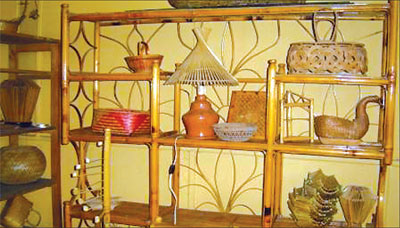UNIDO launches $15.9m bamboo project
By Lalin FERNANDOPULLE
The United Nations Industrial Development Organisation (UNIDO) has
launched a four-year project to develop bamboo plantation in Sri Lanka
as an energy crop, UNIDO (Sri Lanka) Director, Nawaz Rajabdeen said.
He said that around 15,000 hectares will be developed under the
project to serve an industry cluster. UNIDO has released $ 2.69m to set
up industries using bamboo as raw material under its global environment
facility grant scheme. The total cost of the project is $15.9m. The
objective of the project is to develop a bamboo supply chain and product
industry in Sri Lanka leading to reduce the global environmental impact
from GHG emissions with a sustainable industry base.
|

Products made of bamboo |
The project components include policy framework, bamboo tissue
reproduction, setting up of plantations, plantation operation, transfer
of bamboo processing technology to Sri Lanka and pelletising.
“UNIDO has released funds to commence research by the end of this
year. Awareness programs will be conducted on the importance of bamboo
cultivation”, Rajabdeen said.
Currently there is no market for sprouts but an on-going project by
the International Network of Bamboo and Rattan (INBAR)in Sri Llanka is
planning to develop such an industry and markets. ”Our target is to
develop 15,000 hectares of new bamboo plantations in a specific region
that can serve as an industry cluster. The plantations will be on
degraded land” Rajabdeen said.
The industry would have three products including engineered bamboo
materials for structural applications, bamboo pellets for local energy
use and for export markets and bamboo sprouts for food. Sri lanka has no
bamboo processing industry. China and India have established industries
with the support of UNIDO. This project involves the transfer of bamboo
processing technology from India and China.
Development of a bamboo industry in the country needs transfer of
technology from these countries by buying equipment, capacity building
in operating and maintaining this equipment and development of a network
of local service providers. Rajabdeen said steps have been taken to
transfer technology in tissue reproduction, bamboo processing technology
and bamboo pelettising technology from India and China.
“ As a plantation takes three to four years to mature it is a project
with a long life span, but after four years cropping begins and the
first products will become available which would be sufficient to cover
operation and maintenance costs”, he said. An eco-friendly bamboo
material can help the rural poor generate income and employment
opportunities and will help the country to become a world leader in the
industry.Fourteen species of bamboo are found in Sri Lanka and only five
of them are presently in use. They are widely used in making crafts and
scaffoldings.
The strength of bamboo column, their straight, smoothness, lightness,
cylindrical structure, abundance and shorter period in which they attain
maturity make them suitable for a variety of purposes. Bamboo has
excellent properties and its natural resistance to decay is low.
Chemical preservation using preservatives which have good diffusion
properties, improves the durability of bamboo structures.
World demand for handicrafts made from bamboo has increased
considerably which has helped the development of cottage industries
based on preserved bamboo. The whole biomass of the tree can be utilised.
Bamboo has several characteristics that make it a suitable and
economical building material for building construction, as well as for
scaffolding. Bamboo has been considered as a reinforcement factor for
concrete in place of steel. “The major problem is the shortage of the
raw material. People must be made aware of the value of bamboo to
encourage their supportive participation in development, conservation
and usage aspects”, Rajabdeen said. Bamboo products can be promoted as a
substitute to plastic and polythene goods by highlighting their
environment friendly qualities.Bamboo resources in Sri Lanka are not as
abundant as in many South Asian countries, and consequently the
importance of bamboo in the household economy, construction, and in
cottage industry is comparatively low. The availability of indigenous
bamboo species in forest areas, such as Ochlandra stridula, is
decreasing because of deforestation and over-exploitation.
However, they can still be found abundantly in a few areas in
Ratnapura and Kalutara Districts.
Rajabdeen said that the bamboo industry supports about 250 families
and 690 workers. According to a survey by the Forest Department about 80
percent of people who collect bamboo, process it for household
consumption. The price of bamboo has increased due to the growing
demand. In the past, bamboo was used to make poles, baskets, furniture,
fences and handicraft items. Bamboo is used to construct eco- friendly
houses. |

